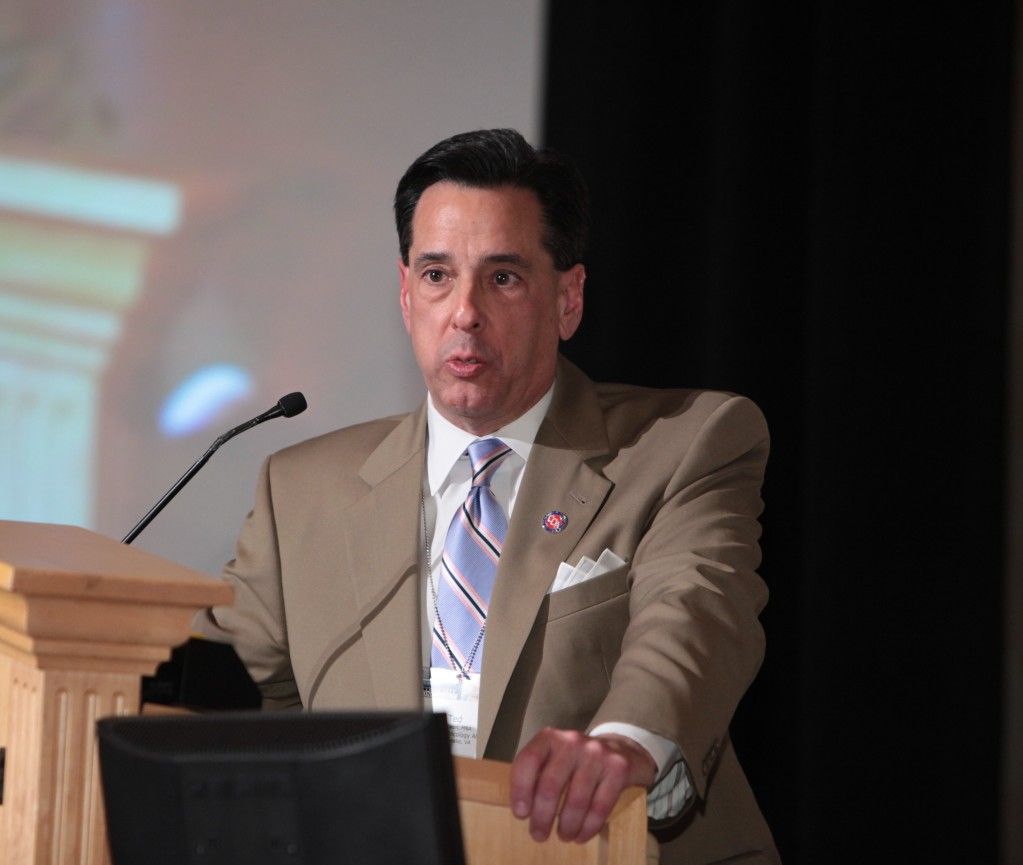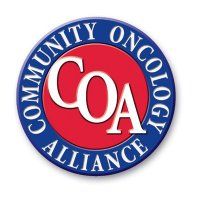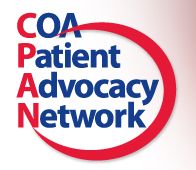|
Join Our List

|
|
Visit Us On Facebook, Twitter & YouTube:
  
|
|
|
|
We appreciate your feedback & suggestions.
Thank you!
roseg@coacancer.org
|
|
|
|
|
|
Hello
 | |
Rose Gerber
Director of Communications and Patient Advocacy
|
This newsletter contains current news on national oncology issues, advocate news alerts and opportunities, and informative content. Ted Okon, COA executive director, provides timely insight into how government issues impact patient care from cancer clinics closing to sequestration's effect on cancer; learn more by reading the report from Capitol Hill section. Additionally, COA's director of policy analysis, Mary Kruczynski, provides updates on oral parity and health insurance exchanges.
In patient advocacy news, I am pleased to report the success of our inaugural patient advocacy summit in Atlanta, GA, held in August. A diverse group of advocates from across the country came together to discuss multiple aspects of patient advocacy and plans for the ongoing national expansion of COA's Patient Advocacy Network (CPAN). In addition to sessions led by COA staff, the following CPAN advocates led educational sessions: Susanne Johnson-Berns, Sheril Bolliger, Jeri Francoeur, Daniel Long, Randy Mansfield, Monica Shane, Monica Thompson, and Brett Wilson. Also attending were
COA practice staff members from North Shore Hematology and Oncology, New York (Nicole Cardaci, director of marketing), Florida Cancer Specialists (Shelly Long, vice president-marketing), and Associates of Oncology Hematology in Maryland (Kim Roddy, practice administrator). The patient advocacy summit provided educational opportunities for advocate attendees and followed the success of other CPAN event
initiatives including the Community Cancer Care Patient Advocacy Summit held in Washington and annual conference programs, which have been held in Las Vegas, NV, and Orlando, FL. Our next CPAN event is our national conference, which will be held April 4-5, 2014 in Orlando, FL.
Be sure to check out our CPAN Advocates News section to get a glimpse of our Advocates for the Care in action. Finally, remember to like us on Facebook and share our alerts. This is a quick and easy way to stay current on all COA/CPAN happenings and help to further awareness of COA's work on behalf of all cancer patients.
|
| Report From Capitol Hill |
 | |
Ted Okon
COA Executive Director
|
Government Spending Battles Hurting Cancer Care
The government shutdown and recent battle over the federal debt ceiling is significantly hurting cancer care. Unfortunately, that's just the tip of the iceberg regarding the damage the government is doing to cancer care in this country. If there was ever a time for the cancer community to rally to stop this damage it is now. The problem is that so many, including a lot of cancer organizations, don't really understand the harm being done to cancer care.
It's important to be aware of the fact that the government pays for more than half of all cancer care through Medicare and Medicaid programs. It doesn't matter if someone is not covered by either program. Because the government is the single largest payer of cancer care, it has a huge influence over how cancer care is paid for by all insurers. You should also know that there are enormous political pressures to reduce spending on Medicare and Medicaid. The government typically does that by finding every possible way to cut payments for drugs and services, just like it is doing to cancer care.
When Congress failed to cut government spending last year, it triggered a last resort called "sequestration"--automatic spending cuts to defense, education, Medicare, and other programs. In the case of Medicare, sequestration forced a 2% cut to all Medicare spending, including funds for cancer drugs and services. If this sounds like a tiny amount, it isn't when it comes to cancer drugs. The government already pays for many cancer drugs at a rate lower than their costs. By cutting payments further due to sequestration, it pushed payments for most drugs to less than their cost. This has forced community cancer clinics, where the majority of Americans with cancer are treated, to make a difficult decision--send certain patients to hospitals for treatment or absorb the losses and eventually have to close their doors.
As if the payment cut from sequestration was not bad enough, the government is proposing to make deeper payment cuts to cancer care in 2014. Unfortunately, these cuts apply not only to the administration of cancer drugs, but to radiation treatment as well as diagnostic imaging and other testing essential to identifying cancer and managing its treatment.
Even without all of these payment cuts, community cancer clinics have been under enormous pressures to stay open. In fact, many have closed treatment locations - 288 in the the last six years - and others have been forced to merge into large hospital systems - 469 over the same time period. When treatment facilities are closed cancer patients fall between the so-called "treatment cracks" when they simply can't or don't want to travel distances to get treated, especially in rural areas. And when clinics are forced to merge into large hospital systems patients pay a lot more for cancer care, as does Medicare and insurance companies. This is a vicious cycle because these higher costs all come back to us, the taxpayers, and put even more pressure to cut Medicare spending.
At COA we are fighting hard to stop these cuts to cancer care. First, Congresswoman Renee Ellmers from North Carolina has introduced a bill that would stop the sequester cut to cancer drugs. It's called the Cancer Patient Protection Act of 2013 and has more than 100 House Representatives cosponsoring it. In addition, Congressmen Paul Tonko from upstate New York and Devin Nunes from California just sent a letter along with 112 other Representatives to the head of Medicare asking her to not make the new proposed payment cuts. Recently, COA President Dr. Mark Thompson from Ohio and COA Board member Dr. Michael Diaz from Florida spent a day away from treating their patients to advocate for them on Capitol Hill on behalf of COA. Meanwhile, oncologists and practice heads all across the country have been reaching out to both their Representatives and Senators on the crisis facing cancer care.
I implore all of our advocates- - patients, caregivers, providers and survivors - to educate not only Congress but also other cancer organizations on the crisis in cancer care. October reminds us that we need a cure specifically for breast cancer. However, the "cure" will be elusive, at best, if we don't pay more attention to the current "care" for all types of cancer.
Advocate, advocate, advocate!!!
|
| Oncology News Updates |
 | |
Mary Kruczynski COA Director of Policy
|
Oral Parity
To date 26 states plus the District of Columbia have passed oral parity legislation. This means more than half of the country supporting the premise that a patient requiring cancer therapy in an oral formulation should pay no more out of pocket than he or she would be responsible for, should their cancer treatment be in an infusible or injectable form.
The currently passed legislative landscape includes the following states in the order in which they were passed: 2008 Oregon; 2009 Indiana Iowa, Hawaii, District of Columbia; 2010 Vermont, Connecticut, Kansas, Colorado, Minnesota; 2011 Illinois, New Mexico, Texas, New York, Washington; 2012 New Jersey, Virginia, Maryland, Nebraska, Delaware, Louisiana; 2013 Massachusetts, Utah, Oklahoma, Nevada, Florida, Rhode Island
Along with the passage of legislation questions arise, such as:
-
Is my doctor aware of this legislation when prescribing a cancer treatment for me?
-
Does my doctor understand the law and its implications as it relates to my treatment?
-
What state agency is actually enforcing the drug parity law?
-
Is there a penalty for an insurance company that does not comply?
-
If it exists, is someone monitoring the frequency of non-enforcement?
-
Are cancer patients even aware that these laws exist in their home state?
And, while we do not profess to know all of the answers, there is a coalition called the State Patients Equal Access Coalition (SPEAC), of which COA is a member. SPEAC's mission is to ensure that cancer patients have the appropriate access to a broad range of approved and medically accepted anti-cancer regimens. We welcome you to log on to http://speac.myeloma.org where you can read more topics such as issues & legislation, patient access, shared stories and state-based coalitions. We also encourage you to log on to CPAN's website: www.coaadvocacy.org and be a guest blogger. Just click on the BLOG tab and scroll down to the bottom to record your story. Tell us about your ability to access life-saving oral cancer medications. If you happen to live in a state where oral parity legislation has already passed, we would like to hear about your doctor's familiarity with the law and whether or not you were able to access oral drugs without any additional out-of-pocket costs than you paid for your infusible or injectable cancer drugs. It is only with your help that we address any inequities. The power of your voice is immeasurable! Please let us hear from you today! If you are not living in a state where oral parity legislation has already become law, you may be residing in one where oral parity legislation is currently being considered. Check out the list below and if you see your home state and want to become involved in helping that bill become a law, please reach out to our Policy Director, Mary Kruczynski via email at maryk@coacancer.org or by cell at 215.630.5019. States with Pending Oral Parity Legislation include: Alaska Arizona Georgia Idaho Kentucky Maine Michigan Missouri North Carolina Ohio Pennsylvania South Carolina Wisconsin You can make a difference! Affordable Care Act Health Insurance Exchanges While autumn is certainly a busy season for all of us, we can't help hearing about the implementation of the Health Insurance Exchanges in every newspaper and on every news channel since October 1. And, while many have tried to log on to the Health Insurance Marketplace, many have been unable to do so. Those electronic "glitches" are being feverishly worked upon, so that enrollment can begin and the uninsured can buy insurance. So what about the cancer patient? What types of coverage should he or she be looking for? Well, there is a great tool called the Cancer Insurance Checklist, which is a useful guide to help you find a plan that will meet your precise needs. The checklist does not dictate which plan you should purchase, but rather the essential benefits that any plan you choose should contain. Please visit www.CancerInsuranceChecklist.org before you select your next health plan. If you are happy with your current physician/cancer care delivery team, be certain that they are a participating provider in whatever plan you choose. As a member of the State Patients Equal Access Coalition (SPEAC), COA is working to ensure that the insurance health exchanges in each state will reflect an equal payment system and cost sharing requirements for patients receiving cancer treatment. And, equally as important, those patients have access to the most clinically appropriate treatment for their specific disease. If you find that you are denied access to a treatment that your personal physician feels is the most clinically appropriate for your cancer, COA wants to hear about it. Please log on to COA's Patient Advocacy Network website, CPAN and blog about it. You can access the website here: www.coaadvocacy.org Simply select the blog tab and then scroll down to record your personal story. If we don't know about the problem, we can't help to fix it!
|
|
| CPAN Advocates News | |
Just a glimpse of what our CPAN Advocates are doing as Advocates for the Care ...
Our GA CPAN group has regular quarterly educational meetings and is establishing a consistent CPAN presence at various health-related events in Georgia, including the recent Freedom Festival in Marietta, GA. Thank you to our GA Chapter President, Susanne Johnson-Berns, and all of the dedicated advocates from GA--including Dan Long and Monica Thompson--who will be heading national advocacy committees.
New CPAN Chapters:
North Shore Hematology and Oncology, New York and Oncology Hematology Care, Ohio will be hosting COA's signature patient advocacy launch event "How to Become a Cancer Care Advocate." COA would like to thank the executive staff of each practice for their support. North Shore Hematology and Oncology efforts will be led by Nicole Cardaci, Director of Marketing. Oncology Hematology Care's efforts will be led by CPAN advocate leaders, Nadia Ali and Ricky Payne, both cancer survivors.
Utah has a new addition to the CPAN leadership team. Randy Mansfield will join Sheril Bolliger as we continue to strengthen our CPAN advocacy efforts in Utah. Thank you to Monica Shane for her service as the former CPAN co-Chair in Utah.I would like to offer a special thank you to every advocate who continues to support COA/CPAN. Every effort--from sharing our news via Facebook or through your personal and professional contacts--makes a difference. On behalf of the entire COA staff, we
appreciate all that you do.If you would like to start a CPAN chapter, please contact Rose Gerber, COA director of communications and patient advocacy - roseg@coacancer.org
|
Advocacy Partner News
| |
CPAN is interested in collaborating with local and national cancer advocacy groups. Additionally, we want to work with industry partners. To learn more or to share your ideas, contact COA Director of Communications and Patient Advocacy, Rose Gerber, at roseg@coacancer.org |
| Partnerships & Corporate Member Opportunities | |
COA and CPAN provide great opportunities for interested patient advocacy organizations and corporate members.
To learn more about patient advocacy and collaboration opportunities, contact:
Rose Gerber, COA Director of Communications and Patient Advocacy at roseg@coacancer.org
To learn more about COA's Administrators Network (CAN) and COA's Oncology Medical Home Initiative, contact:
Bo Gamble, COA's Director of Practice Initiatives at bgamble@coacancer.org
To learn more about COA's corporate membership opportunities contact: Mary Kruczynski, COA's Director of Policy Analysis at maryk@coacancer.org
For general COA inquiries, contact:
COA Executive Assistant, Tracey Banks at tbanks@coacancer.org
|
|
Advocate Events and Opportunities
| |

2014 COA Conference
We are going back to Disney World April 4-5, 2014. For those who attended our 8th annual COA conference earlier this year, we hope that you came away armed with the knowledge to advocate for cancer care. For those of you who were not able to join us you will have another opportunity to learn with fellow advocates at the Walt Disney World Swan Hotel in Orlando, Florida. Not only will you participate in two days of educational sessions, but you will also attend some general sessions with the entire cancer care delivery team of physicians, nurses, administrators and others who participate in your care. The conference keynote speaker is Dr. Siddhartha Mukherjee, the Pulitzer Prize Winning Author of The Emperor of All Maladies, a Biography of Cancer. As a CPAN attendee, you will gain attendance to this general session and, if you are one of the first 200 registrants for the conference, will receive an autographed copy of the book! Here is a brief snapshot of some of next year's sessions:
- How to lobby your congressional members
- What is making your doctor sick?
- How to start a CPAN chapter
- How to navigate your own cancer care
- Health Insurance Exchanges and you
- Legislative update from Capitol Hill
Advocacy & the Media
Some favorite quotes from our recent conference, when asked: "What did you enjoy most?"
I learned a lot about how physicians advocate for their patients. There is a strong sense of community here and it was inspiring to learn how I could make an impact.
The fact that the COA meeting has an advocacy track was just great! I liked seeing advocates come together to learn about national oncology issues and take that information back to their communities .
The meetings offered content at all levels of advocacy.
and click on the meeting banner to register.
Advocate Opportunity: Sanofi's Global Oncology Division announces Patient Advocates in Research Opportunity (PAIRS). In this pilot program, the PAIRS advocate will provide his or her unique insights to Sanofi for 12 months as one of their investigational treatments for multiple myeloma progresses through the research and development process, by helping to integrate the patient perspective into Sanofi's work, they can better deliver meaningful cancer treatments to patients in need. Please contact Cheya Pope, Senior Director of Patient Navigation, at cheya.pope@sanofi.com to receive an application or for more information. Applications due by Friday, November 22, 2013 at 5 pm ET.
|
| About The Community Oncology Alliance (COA) & COA's Patient Advocacy Network (CPAN) |

The Community Oncology Alliance (COA) was established in 2003 to advocate on behalf of cancer patients and their oncologists.
The majority of cancer patients are treated in a community cancer clinic. (Other types of care environments include state and regional hospitals and academic based cancer centers.)

The COA Patient Advocacy Network (CPAN) was created to include the patient voice.
COA was founded by community oncologists in response to the Medicare Modernization Act of 2003, which planned cuts to oncologist reimbursement, a move that directly and negatively impacts patient care. COA members are community cancer centers, oncologists, nurses, practice administrators, and pharmaceutical partners.
|
Action Items - Quick and Easy!
| |
Join Our Email List
Interested in Volunteering?
Our Patient Advocacy Website (Updates in Progress)
COA's Main Website
Follow COA on Facebook
Follow Ted Okon, COA Executive Director, on Twitter - @TedOkonCOA
|
|
|